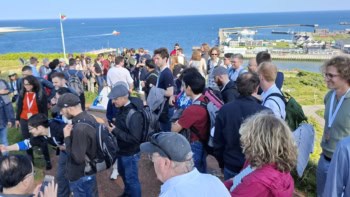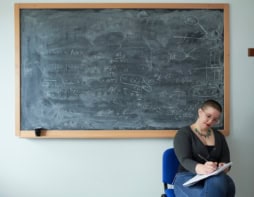Do you use vacations to unwind from physics or to focus on it without distraction? Robert P Crease wonders what holidays mean to physicists in the 21st century

I once went to a New Year’s Eve party when I heard a graduate physics student apologize for leaving early. He was working on an accelerator experiment, he explained, and his shift was starting at midnight. To the astonishment of almost everyone, he seemed to be looking forward to getting back into the lab. I, though, was not surprised, having interviewed enough scientists to recognize their enthusiasm for regarding leisure time as a precious opportunity to work.
The history of science is full of discoveries by researchers supposedly on holiday. Harold Urey, a chemistry professor at Columbia University, famously discovered deuterium on Thanksgiving Day 1931, which is a time when Americans cook, eat turkey and pumpkin, and hang out with relatives, including many they haven’t seen in a while. Not Urey, who sent the Physical Review a paper about his Thanksgiving Day work the following week, and won the Nobel Prize for Chemistry three years later.

Holiday hotspots for physicists
In 1956 another Columbia researcher, Chien-Shiung Wu, and her husband were planning a vacation in the Far East to celebrate the 20th anniversary of their emigration from China. They had booked tickets on the Queen Elizabeth – but Wu backed out, and left her husband to take the trip alone. She wanted to take advantage of an opportunity that had arisen to investigate Tsung-Dao Lee and Chen-Ning Yang’s recent idea that parity conservation had not been experimentally tested in the weak interaction. By the beginning of the next year, Wu and her team discovered that parity was violated in the weak interaction, in one of the most surprising finds in the history of physics.
Another famous working-holiday find took place at the end of 1925, when the Austrian physicist Erwin Schrödinger, who was then married, went on a skiing vacation in Arosa, Switzerland with a girlfriend. He returned on 9 January 1926 with the rudiments of the wave equation that would revolutionize quantum physics, and earn him a share of the 1933 Nobel Prize for Physics (with Paul Dirac).
Moonlighting
I have also heard of physicists who have been caught secretly working while supposedly doing something else. The Israeli theoretical physicist Yuval Ne’eman, for example, was an active member of the Knesset in the 1980s, after helping to found a right-wing political party. However, he was often chastised by reporters and politicians after TV cameras swooped in on him during boring speeches and caught him doing physics equations.
In fact, I have often encountered the feeling that physicists view it as their right to work on holiday. I remember once asking a physicist about an interview he’d had for a job at Bell Labs. He told me that it had all gone well – until he’d asked if he’d be able to work in his lab over Thanksgiving. The interviewer hesitated, then finally promised him that he could. “And what about Christmas?” The interviewer hemmed and hawed, but could not commit. “I took the job anyway,” the physicist told me, frowning.
And even if you instruct physicists to take a break, they often don’t. During the summers in the early years of Brookhaven National Laboratory, scientists were expected to stop work early on Friday afternoons and go to a nearby beach on the south shore of Long Island. But I have it on good authority that on many such occasions some of them – including Lee and Yang, who were visiting the lab that summer – used sticks to write equations in the sand.
I recall speaking with one old-timer, whose name I have forgotten, who reminisced about the days when physicists travelled back and forth between the US and Europe by boat. They would typically have a blackboard installed in their staterooms – the old slate kind that you wrote on with chalk – and would use the journey of a week or so to let their imaginations fly. “I don’t know how today’s jet-setting physicists can do any serious thinking,” this person told me.

Physics-themed holidays, meet the next director of the European Spallation Source
However, physicists do know how to relax. Albert Einstein liked sailing and the violin. Niels Bohr played football. And Robert Oppenheimer took postdocs to his New Mexico ranch, where he forbade them to talk of physics except when they had an eminent visitor. In one story, Oppenheimer took his guests horseback riding at midnight on a mountain ridge in a cold downpour in the middle of a lightning storm. Coming to a fork in the path, Oppenheimer said “That way it’s seven miles home, but this way it’s only a little longer, and it’s much more beautiful!”
But the passion with which physicists pursue these hobbies can have a dark side. The CERN experimental physicist Paul Musset, who was a musician and climber in his spare time, died in a mountaineering accident on Mont Blanc in 1985. Musset was 52, an active researcher who sometimes worked nearly through the night, and had been a candidate for the Nobel prize as a co-discoverer of weak neutral currents. I also recall one male experimental physicist confessing to me how ashamed and guilty he felt staying in the lab to do an experiment early in his career. Expecting imminent crucial results, he ended up missing the birth of his first child.
The critical point
But perhaps what I have described is a thing of the past, and physics in the 21st century has become so professionalized and bureaucratic that today’s practitioners more frequently view it as a drudge that they can’t wait to break free of. Or maybe, with e-mail and Zoom calls constantly connecting us with the world, holidays don’t even give physicists a break. So do you view holidays as opportunities to interrupt your work, or to intensify it? Send me your experiences and I’ll write about them in a future column.



